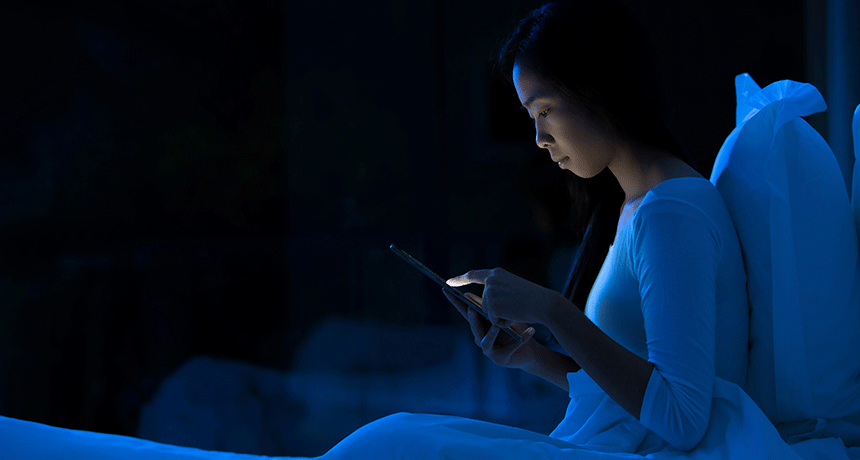Trading smartphone time for sleep? Your loss
Teens are logging more time on electronic devices — and sleeping less, data show

More teens than ever aren’t getting enough sleep. Smartphones may be to blame, researchers now suspect.
torwal/istockphoto
Increasingly, U.S. teens are trading sleep time for screen time. That’s the finding of a new study. It analyzed survey data from hundreds of thousands of adolescents. And they showed that the share of teens who are losing more sleep and logging more screen time rose dramatically between 2009 and 2015.
Most sleep experts agree that from ages 12 to 17, teenagers need about nine hours of sleep a night. When teens don’t get enough shut-eye, their bodies and minds suffer.
“Lack of sleep is linked to depression, anxiety, poor school performance and obesity,” says Jean Twenge. A psychologist who works at San Diego State University in California, she is the lead author of the new study.
Her team shared its findings in the November issue of Sleep Medicine.
Changing trends
The researchers scouted for changes over time in teens’ online activity and sleep patterns. To do this, they pored over U.S. data from two long-running national surveys. Each had asked students about their sleep habits. Together, those surveys included data on some 370,000 teens.
In 2015, more than four in every 10 adolescents logged fewer than seven hours of sleep a night. That’s at least two hours less than experts recommend. That’s also about 17 percent more teens than slept fewer than seven hours nightly just six years earlier.
Twenge and her team think smartphones have something to do with teens’ diminishing sleep.
Beginning around 2009, smartphone use among the general U.S. population went up sharply, Twenge notes. Her team now suspects teens are increasingly foregoing sleep for texting, using social media or watching videos on their phones. Teens who used electronic devices at least five hours a day were 50 percent more likely not to get enough sleep, they found. That’s compared to students who spent only an hour a day on such devices.
Twenge’s group also looked into whether TV watching, homework or after-school jobs were linked to falling sleep time. In fact, none of those appeared to make a difference.
The light emitted by screens can interfere with the body’s natural sleep-wake rhythms, studies show. Cell phones, tablets and computers give off all colors of light. But the light in the blue portion of the color spectrum “tricks the brain” into thinking it is still daytime. And that, data have shown, can make it harder to fall asleep.
Use of electronic devices near bedtime “is a problem,” says Kyla Wahlstrom. She studies the science of sleep at the University of Minnesota, in Minneapolis. “When students turn their devices off to go to sleep,” she explains, “the brain needs about one hour to become sleepy.”
Some phones have a so-called “night shift” mode. It reduces the blue light that their screens emit. Still, Tweng points out, that change isn’t enough to erase the effects of late exposures to their screens. Those phones are “still too stimulating,” she says, “and could keep you from sleeping well.”
And looking at your screen in the middle of the night — to scan an incoming text, for example — also “wakes up your brain,” Wahlstrom adds. So even if you go right back to sleep, she says, you will have had fewer hours of quality sleep.
Additional support for the new findings
The new findings by Twenge’s team emerged just as a group of experts gathered in Washington, D.C., on November 1 to discuss potential sleep impacts of digital media. This meeting was sponsored by Children and Screens: Institute of Digital Media and Child Development. This nonprofit group is based in New York City. Teens average nine hours each day engaged with online entertainment, according to its research, presented at the meeting. And this did not count online time at school or doing homework. Kids ages 8- to 12-years-old spend almost six hours per day on such online entertainment.
At the meeting, the group pointed to dozens of its own studies and those by other researchers. Data from these studies have linked screen time with getting too little sleep. Extra screen time seems to lead to later bedtimes, those studies show. Since school wake-up times don’t change, that leads to reduced total sleep time. Twenge’s research is the most recent to support this link. It also underscores the likely link to the teen’s excessive use of smartphones.
Twenge’s advice? Turn your phone off and put it in another room when you’re sleeping. Don’t use your phone for at least 30 minutes before bed. “It’s fine to use your phone for up to two hours a day, but after that there is a link to sleeping too little,” Twenge notes.
Janet Croft studies teens and sleep at the Centers for Disease Control and Prevention (CDC) in Atlanta, Ga. She agrees that it’s important to keep all electronic devices out of the bedroom. It’s also important, she says, to practice good sleep hygiene. By that, she means teens should go to bed and wake up at the same time each day, even on weekends.
Notes Croft: “When adolescents get enough sleep, they are often more attentive in academic settings, alert while driving and physically prepared when engaging in activities.”







